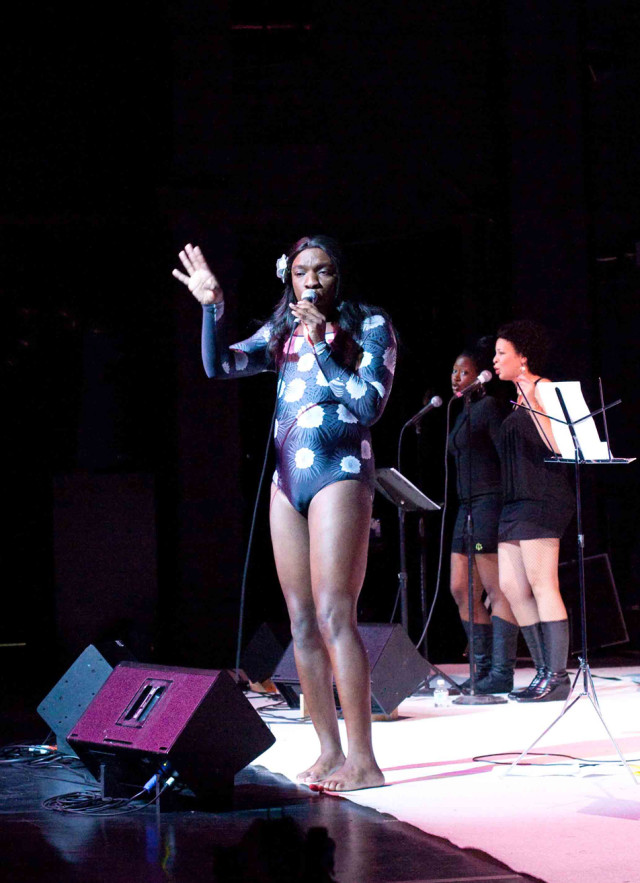This Ain’t No Chewing Gum

Never underestimate the power of Labisha. Kalup Linzy, in a sundress and a dark wig, grabbed a hold of the audience at Washington High School and never let them go. There was standing room only for a half hour before the show even started, as everyone crowded in to see the artist who, judging by almost every piece of promotional material, is the de facto spokesman for this year’s festival.
He opened with "Sampled and LeftOva," which sounded like a lost track from Stevie Wonder’s Songs in the Key of Life and Inner Visions days. Instead of the heavy auto-tune, record scratches, and vocal distortions of the recorded version, his live performance was boiled down to the lyrics and the often sad, hilarious, and poignant story he told.
This continued through the rest of the show, too. Linzy moved through soul and funk during the show, singing from the perspectives of his Conversations wit de Churen characters, and reverently sticking to the conventions of the genres he sang in. He sang a parody of Otis Redding, "Sitting on the Edge of My Couch," about waiting for a man to come over and closed with a cover of Tina Turner’s version of "Proud Mary." The music of the original songs sounded like something you’ve already heard in your childhood—each could just have easily been sung by Aretha Franklin, Beyoncé, or Diana Ross (the double-entendre soaked lyrics from the perspective of a gay man would make quite a Whitney Houston performance).
Just as the Churen series is a loving twist on the conventions of a soap opera, portraying the raunchiness of real phone conversations, Linzy’s lyrics often cut to the chase where a normal R & B song would dance around the issue. Instead of using euphemisms to describe why a man is no good, Linzy just says what we’re all thinking: F*** you. Who asks "what’s love got to do with it?" They think what Linzy sings: "What an a-hole."
While much of the vocal disguising and manipulation present in his videos and recorded work was stripped away live, some of it persisted in a voice modulator in pianist Ben Darwish’s mic. As Linzy would sing about a no-good trade, Darwish would come in as the male character in the song with a put-down speaking with a parodically masculine low voice. For the best number, "Chewing Gum," which is sung from the perspective of several Churen characters as a conversation about a night out, Linzy invited audience members to come sing the refrain from the female character’s view, "This ain’t no chewing gum," using the high-pitched modulation. The funny part about Linzy’s modulation is how normal it seems now. To an audience in 2002, maybe, it could distract a listener’s attention. Listen to the radio today, though: Black Eyed Peas and Kanye West are using the same voice distortion effects that Linzy’s been using for years, making them into integral parts of hit records. Linzy’s technique to parody mainstream music and separate himself from it has ironically become one of this decade’s defining sounds.
Through the voice changes, the costume changes, and the wig changes, Linzy had the goals of a true performer in mind. He simply wanted the people who came to the Works to have as good a time in the audience as he was having on stage. Rest easy, Mr. Linzy—we did.
